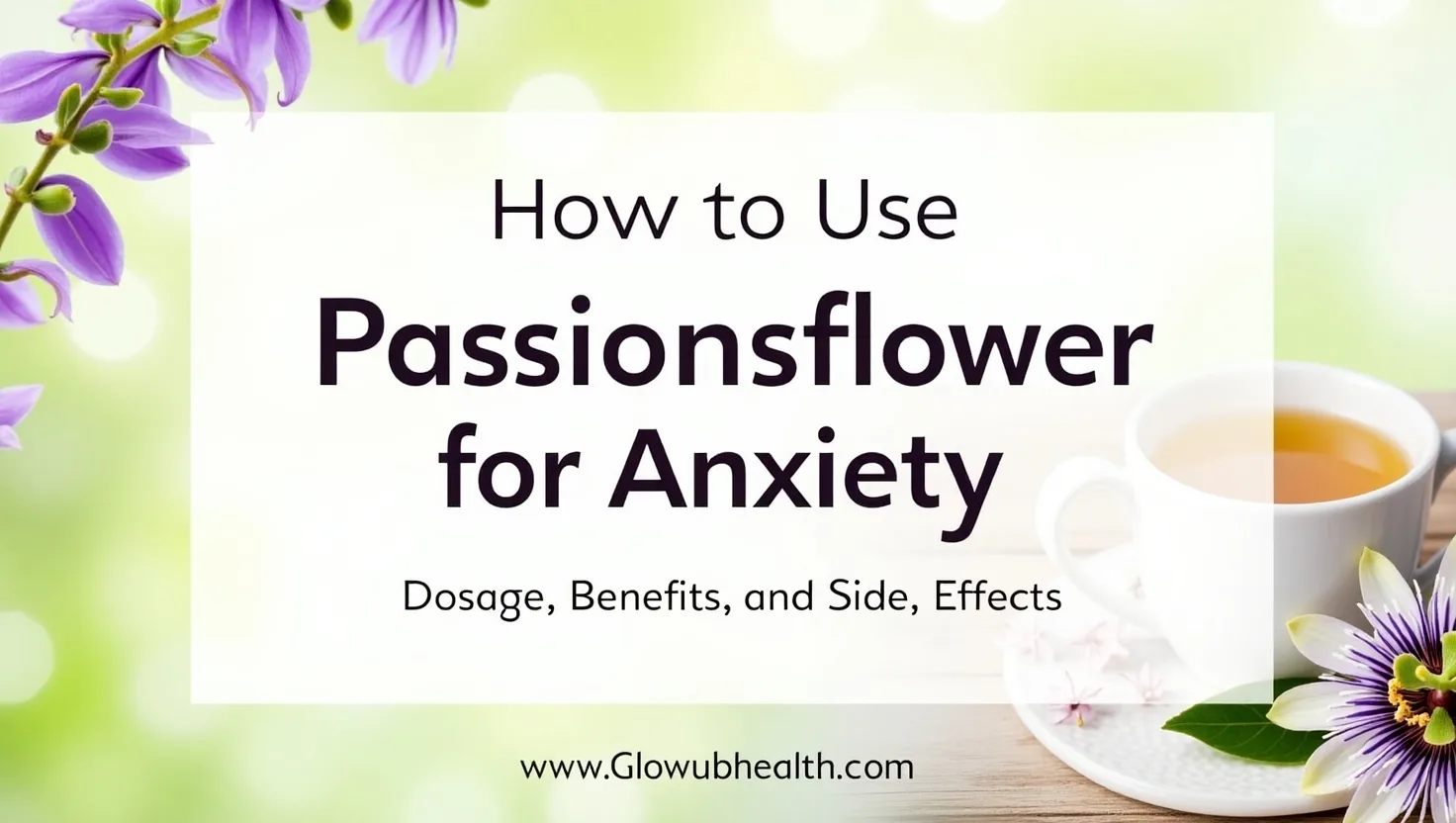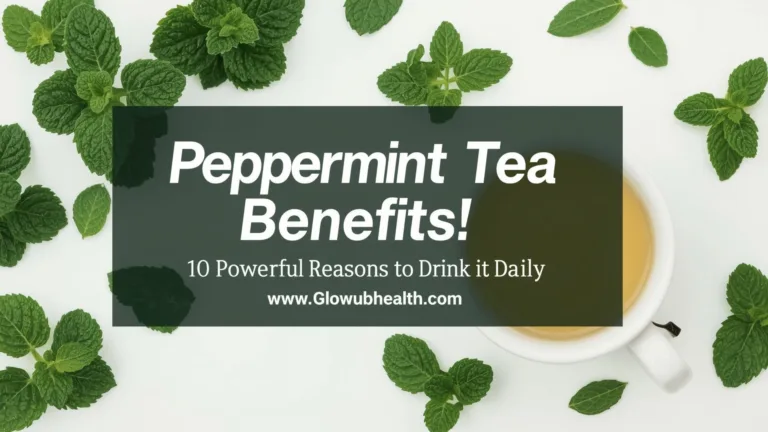How to Use Passionflower for Anxiety : Dosage, Benefits, and Side Effects
Anxiety is a common mental health condition that affects millions of people worldwide. Whether it’s the pressure of work, the weight of responsibilities, or general life stress, anxiety can interfere with daily life and well-being. Fortunately, natural remedies like passionflower for anxiety have gained significant attention for their calming effects. In this comprehensive guide, we’ll explore how to use passionflower for anxiety, its benefits, the correct dosage, potential side effects, and more.
This content is for informational purposes only and is not a substitute for professional medical advice, diagnosis, or treatment. Always consult your healthcare provider before using herbal remedies, especially if you are pregnant, nursing, or taking medications.
Introduction: Understanding Anxiety and the Need for Natural Solutions
In today’s fast-paced world, anxiety has become a widespread issue. Traditional treatments, such as prescription medications, often come with side effects or the potential for dependency, leading many to search for more natural alternatives. Passionflower, a vibrant flowering plant known for its therapeutic properties, has emerged as a promising solution.
Used for centuries in traditional medicine, passionflower is believed to reduce anxiety and stress, promoting a sense of calm and relaxation. The calming effects of passionflower can be attributed to its active compounds, which interact with the brain’s neurotransmitters. But how exactly does it work? What is the right dosage? And are there any side effects?
This article will dive deep into passionflower for anxiety, providing well-researched insights, tips, and actionable advice to help you incorporate this herb into your anxiety management routine.
What is Passionflower?
The Origins and History of Passionflower
Passionflower (Passiflora incarnata) is a climbing vine native to the southeastern United States. It is known for its striking, exotic appearance, with large, colorful flowers that resemble a mystical, intricate design. For centuries, passionflower has been used in herbal medicine to treat a variety of conditions, including anxiety, insomnia, and nervous disorders.
The use of passionflower dates back to the early 16th century, where it was embraced by indigenous cultures in North and South America. It was later introduced to European herbal medicine, where it became renowned for its calming effects.
Active Compounds in Passionflower
The plant contains several active compounds, including alkaloids, flavonoids, and glycosides, which are believed to work together to ease symptoms of anxiety. These compounds are thought to have a calming effect on the nervous system, promoting relaxation and reducing stress.
How Passionflower Helps with Anxiety
The Mechanism Behind Passionflower’s Calming Effects
The primary reason passionflower for anxiety is so effective lies in its ability to interact with neurotransmitters in the brain, particularly gamma-aminobutyric acid (GABA). GABA is a neurotransmitter responsible for inhibiting overactive brain activity, which is often a contributing factor to anxiety. By increasing GABA levels in the brain, passionflower helps calm the mind and body, making it easier to manage stress and anxiety.
Additionally, studies suggest that passionflower may have a mild sedative effect, which can be helpful for individuals who struggle with insomnia due to anxiety. Some research even indicates that passionflower can work as effectively as pharmaceutical drugs like benzodiazepines, but without the addictive risks.
Research Supporting Passionflower for Anxiety
Numerous studies have examined the effectiveness of passionflower in reducing anxiety. In a 2013 study published in Phytotherapy Research, researchers found that passionflower was as effective as the commonly prescribed medication oxazepam in reducing anxiety in individuals with generalized anxiety disorder (GAD) without causing drowsiness.
Another study, published in The Journal of Clinical Psychopharmacology, revealed that patients who took passionflower experienced a reduction in anxiety symptoms comparable to those taking a pharmaceutical anti-anxiety medication.
Passionflower Benefits for Anxiety
1) Natural Stress Reliever
One of the most well-known passionflower benefits is its ability to reduce stress. Whether you’re experiencing chronic stress or a sudden anxiety attack, passionflower’s calming effects can help you feel more at ease.
2) Promotes Better Sleep
Anxiety often interferes with sleep. By promoting relaxation and calming the nervous system, passionflower can help improve sleep quality. Many people use passionflower tea or supplements before bed to help them unwind and fall asleep more easily.
3) Supports Mental Clarity
Chronic anxiety can cloud your mind and make it difficult to think clearly. Passionflower has been reported to support mental clarity by reducing the overwhelming feelings of stress and worry, allowing for better focus and decision-making.
4) May Reduce Symptoms of Generalized Anxiety Disorder (GAD)
GAD is characterized by excessive, uncontrollable worry. Studies have shown that passionflower for anxiety can help reduce the intensity of these worries, offering relief from the constant cycle of anxious thoughts.
5) No Known Risk of Dependence
Unlike prescription anti-anxiety medications, passionflower does not carry a high risk of dependence or addiction. This makes it a safer alternative for long-term anxiety management.
How to Use Passionflower for Anxiety: Dosage and Forms
Passionflower Tea: The Soothing Drink for Relaxation
Passionflower tea is one of the most popular and accessible ways to use passionflower for anxiety. Brewing a cup of this calming tea can be an excellent way to wind down after a stressful day. To make passionflower tea, follow these simple steps:
- Steep 1-2 teaspoons of dried passionflower leaves or flowers in hot water for 5-10 minutes.
- Strain and enjoy! Add honey or lemon to taste if desired.
Drinking passionflower tea before bedtime is particularly beneficial for those who struggle with sleep due to anxiety.
Passionflower Supplements
For those who prefer a more concentrated form, passionflower is also available in capsules or liquid extract form. The dosage will vary depending on the product, but a common recommended dosage for anxiety is 250-500 mg of passionflower extract, taken 1-2 times per day.
Always consult with a healthcare professional before starting any supplement, especially if you are currently taking medications or have pre-existing health conditions.
Passionflower Tincture
Passionflower tincture is another option for anxiety relief. This concentrated liquid extract can be taken by placing a few drops in a glass of water or directly under the tongue. Tinctures are typically more potent than tea, so start with a small dose (5-10 drops) and gradually increase if needed.
Dosage Recommendations
While the optimal dosage may vary depending on the form used and the individual’s needs, a typical dosage of passionflower for anxiety may range from 250 mg to 500 mg per day in supplement form, or 1-2 cups of passionflower tea daily. It’s important to start with a lower dosage to assess how your body reacts and adjust accordingly.
Potential Side Effects of Passionflower
While passionflower for anxiety is generally considered safe, it’s important to be aware of possible side effects, especially when used in high doses or for extended periods. Some individuals may experience:
- Drowsiness: Due to its sedative effects, passionflower can cause drowsiness or lightheadedness, particularly when taken with other sedatives or alcohol.
- Stomach upset: Some people may experience digestive discomfort, such as nausea or an upset stomach.
- Allergic reactions: In rare cases, people may be allergic to passionflower, leading to skin rashes, itching, or difficulty breathing.
If you experience any of these side effects, reduce the dosage or discontinue use and consult a healthcare provider.
Passionflower and Drug Interactions
Passionflower may interact with certain medications, particularly those that affect the central nervous system (CNS). If you are taking medications for anxiety, depression, or sleep disorders, it’s essential to consult with a doctor before using passionflower to avoid potential interactions.
Conclusion: Is Passionflower the Right Choice for Your Anxiety?
Passionflower for anxiety offers a natural, safe, and effective solution for many individuals seeking relief from stress and anxiety. With its ability to calm the nervous system, promote better sleep, and improve mental clarity, passionflower can be a valuable tool in managing anxiety without the risk of dependence.
However, as with any supplement or herbal remedy, it’s important to approach passionflower with care. Start with a low dose, monitor your body’s response, and always consult with a healthcare professional before incorporating it into your routine, especially if you’re already taking prescription medications.
If you’re looking for a natural, soothing remedy to help manage anxiety, passionflower tea or supplements might be just what you need. By understanding the proper dosage, benefits, and potential side effects, you can use passionflower to enhance your overall well-being and achieve a greater sense of calm in your daily life.
FAQ
1. What is Passionflower and how does it help with anxiety?
Passionflower (Passiflora incarnata) is a flowering plant known for its calming properties. It helps with anxiety by increasing levels of gamma-aminobutyric acid (GABA) in the brain, which reduces overactive brain activity associated with anxiety. This leads to a sense of relaxation and helps manage stress and anxiety effectively.
2. How do I use passionflower for anxiety?
Passionflower can be consumed in various forms to help alleviate anxiety:
Passionflower tea: Steep 1-2 teaspoons of dried passionflower leaves or flowers in hot water for 5-10 minutes.
Passionflower supplements: Common dosages range from 250 mg to 500 mg, taken once or twice a day.
Passionflower tincture: Add a few drops (5-10) to water or take directly under the tongue for quick relief.
3. What is the recommended dosage of passionflower for anxiety?
For anxiety, the typical recommended dosage is:
Tea: 1-2 cups daily.
Capsules or liquid extract: 250-500 mg, taken 1-2 times per day.
Start with a lower dose to gauge your body’s reaction and adjust accordingly.
4. Are there any side effects of passionflower?
Passionflower is generally safe but may cause side effects, including:
Drowsiness or dizziness: Especially when taken in high doses or with other sedatives.
Upset stomach: Some people may experience digestive discomfort.
Allergic reactions: Rare cases of skin rashes, itching, or difficulty breathing.
If you experience these side effects, reduce the dosage or discontinue use and consult a healthcare professional.
5. Can I take passionflower with other medications?
Passionflower may interact with medications that affect the central nervous system (CNS), such as antidepressants, anti-anxiety drugs, or sleep medications. Always consult a doctor before using passionflower if you are on other medications to avoid potential interactions.
6. How long does it take for passionflower to work?
The calming effects of passionflower can typically be felt within 30-60 minutes of consumption, especially when taken as a tea or tincture. However, for long-term anxiety relief, it may take several days or weeks of consistent use to experience the full benefits.
7. Is passionflower safe for long-term use?
Passionflower is generally considered safe for short-term use. However, long-term use should be discussed with a healthcare provider, particularly if combined with other treatments. Some people use it periodically as needed for acute anxiety or stress, but always under medical supervision if used long-term.
8. Can passionflower help with sleep issues caused by anxiety?
Yes, passionflower is commonly used to promote better sleep, especially for those whose anxiety interferes with rest. By calming the nervous system, passionflower can help ease you into a peaceful sleep, making it a great option for individuals with anxiety-induced insomnia.






